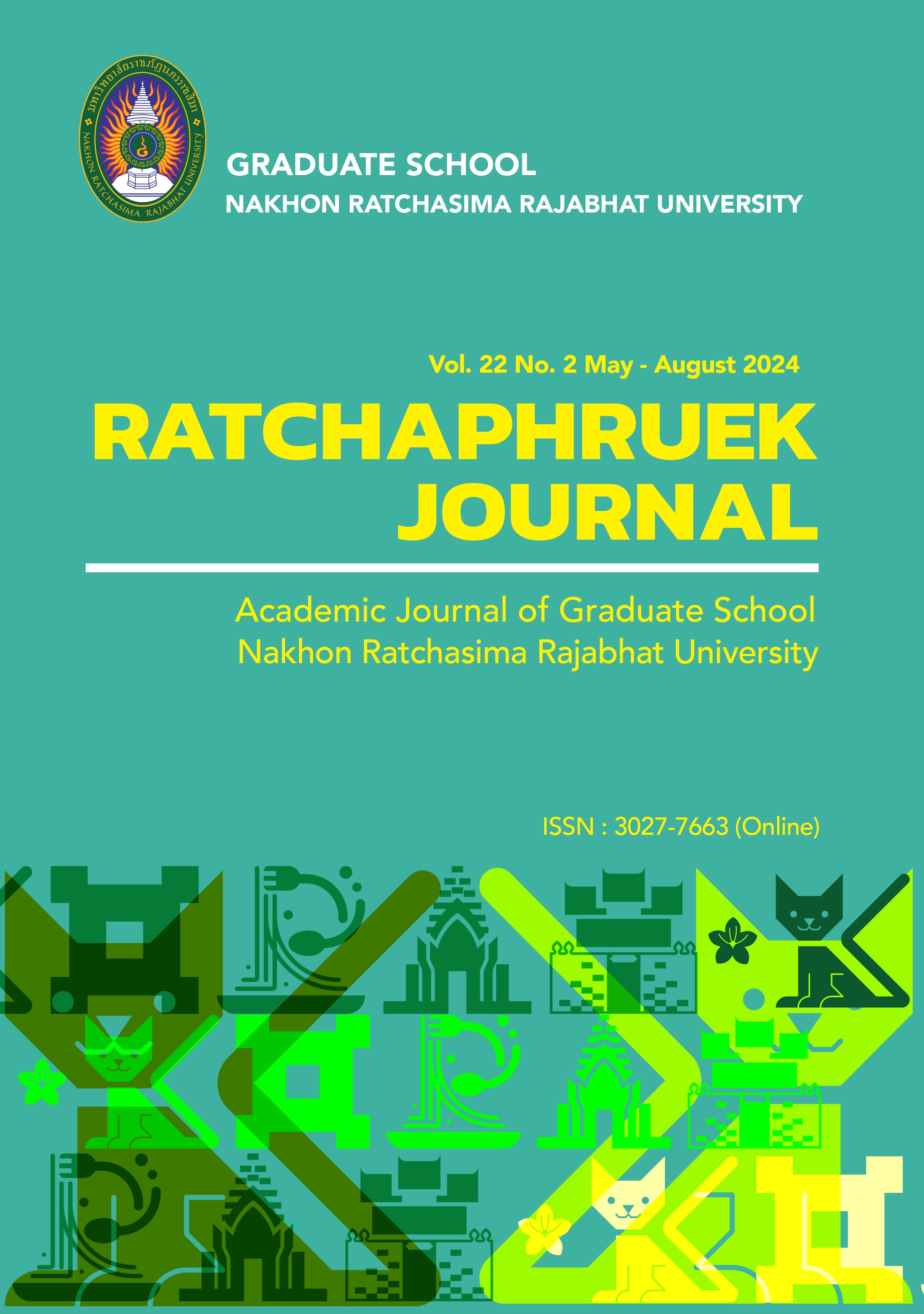Effects of Implementing Integrated Computer-Assisted Language Learning and Task-Based Learning Activities to Improve Vocational Students’ English Writing
Main Article Content
Abstract
The objectives of this study were to examine: 1) the effects of integrated computer-assisted language learning and task-based learning activities on the English writing ability of high vocational certificate students, and 2) students’ satisfaction with learning English through these integrated activities. The population consisted of 42 first-year high vocational certificate students majoring in General Management at a commercial college in Nakhon Ratchasima province. The sample included 22 first-year high vocational certificate students majoring in General Management, selected using the cluster sampling method. The research instruments were lesson plans, an English writing ability test, and a satisfaction questionnaire. Mean scores ( ), standard deviation (S.D.), and t-test were utilized to analyze the data.
The results revealed that the mean score of students’ English writing ability in the post-test was significantly higher than in the pre-test at the .05 level. Additionally, the students expressed the highest level of satisfaction with learning English through integrated computer-assisted language learning and task-based learning activities. This indicates that using these integrated learning activities can improve students’ English writing ability.
Article Details

This work is licensed under a Creative Commons Attribution-NonCommercial-NoDerivatives 4.0 International License.
References
Ali, H. H. H. (2022). The importance of the four English language skills: Reading, writing, speaking, and listening in teaching Iraqi learners. Humanitarian and Natural Sciences Journal, 3(2), pp. 158-159.
Asrifan, A., Zita, C. T., Vargheese, K. J., Syamsu, T. & Amir, M. (2020). The effects of CALL (Computer assisted language learning) toward the students’ English achievement and attitude. Journal of Advanced English Studies, 3(2), pp. 94-106.
Bao, R. & Du, X. (2015). Implementation of task-based language teaching in Chinese as a foreign language: benefits and challenges. Language, Culture and Curriculum, 28(3), pp. 291-310.
Beatty, K. (2010). Teaching and researching computer-assisted language learning. London: Pearson Education
Limited.
Beatty, K. (2010). Teaching and researching computer-assisted language learning. London: Pearson Education Limited.
Brown, J. D. (2017). Developing and using rubrics: Analytic or holistic. Shiken (JALT Testing & Evaluation SIG Newsletter), 21(2), pp. 20-26.
Chapelle, C. A. (2010). The spread of computer-assisted language learning. Language teaching, 43(1), pp. 66-74.
Dina, A. T. & Ciornei, S. I. (2013). The advantages and disadvantages of computer assisted language learning and teaching for foreign languages. Procedia-Social and Behavioral Sciences, 76(1), pp. 248-252.
Edwards, C. & Willis, J. R. (Eds.). (2005). Teachers exploring tasks in English language teaching. Basingstoke: Palgrave Macmillan.
Ellis, R. (2003). Task-based language learning and teaching. Great Clarendon Street: Oxford University Press.
Fareed, M., Ashraf, A. & Bilal, M. (2016). ESL learners’ writing skills: Problems, factors and suggestions. Journal of education and social sciences, 4(2), pp. 81-92.
Ghufron, M. A. & Nurdianingsih, F. (2021). Flipped classroom method with computer-assisted language learning (CALL) in EFL writing class. International Journal of Learning, Teaching and Educational Research, 20(1), pp. 120-141.
Hani, N. A. B. (2014). Benefits and barriers of computer assisted language learning and teaching in the Arab world: Jordan as a model. Theory and Practice in Language Studies, 4(8), pp. 1609-1615.
Intasuk, B. Thienpermpool, P. Torut, S. Torut, B. & Sukamolson, S. (2021). Using Northern Thai cultural content and task-based approach in teaching students’ communicative reading-writing. Journal of Humanities and Social Sciences, 9(1), pp. 63-77.
Jafarian, K., Soori, A. & Kafipour, R. (2012). The effect of computer assisted language learning (CALL) on EFL high school students’ writing achievement. European Journal of Social Sciences, 27(2), pp. 138-148.
Kafipour, R., Mahmoudi, E. & Khojasteh, L. (2018). The effect of task-based language teaching on analytic writing in EFL classrooms. Cogent Education, 5(1), pp. 1-16.
Nasser, A. N. A. (2016). Teaching the writing skill to Yemeni EFL learners: The importance and challenge. South-Asian Journal of Multidisciplinary Studies (SAJMS), 3(6), pp. 191-203.
Rao, P. S. (2019). The role of English as a global language. Research Journal of English, 4(1), pp. 65-79.
Riska, F. (2021). The influence of using task-based learning through students’ ability in writing recount text at the second semester of eight grade students of SMP AL-Huda Jatiagung Lampung Selatan in the academic year 2020/2021 (Doctoral dissertation in English Education, Universitas Islam Negeri Raden Intan Lampung).
Robinson, P. (2011). Task-based language learning: A review of issues. Language learning, 61, pp. 1-36.
Seensangworn, P. (2017). Writing problems and writing strategies of English major and non-English major students in a Thai university. MANUTSAT PARITAT: Journal of Humanities, 39(1), pp. 113-136.
Sholeh, M. B. (2020). Implementation of task-based learning in teaching English in Indonesia: Benefits and problems. Language Circle: Journal of Language and Literature, 15(1), pp. 1-9.
Siregar, S. P. E., Sari, F., Sudjoko, S. & Yundayani, A. (2022). Dealing with english writing skills: Through the eyes of vocational students. Eureka: Journal of Educational Research, 1(1), pp. 18-28.
Vocational Education Commission. (2020). The Curriculum of Business Administration in Management. Retrieved April 13, 2020, from https://bsq.vec.go.th/Portals/9/Course/30/2563/30200/30215v11
Willis, J. (1996A). A flexible framework for task-based learning. Challenge and change in language teaching, 52(1), pp. 52-62.
Willis, J. (1996B). A framework for Task-Based Learning. Essex: Addison-Wesely Longman.
Yundayani, A. & Ardiasih, L. S. (2021). Task-based material design for academic purposes: Learners' English writing skill improvement. Studies in English Language and Education, 8(1), pp. 258-275.
Zaini, A. & Mazdayasna, G. (2014). The effect of computer assisted language learning on the development of EFL learners’ writing skills. Procedia-Social and Behavioral Sciences, 98(1), pp. 1975-1982.


